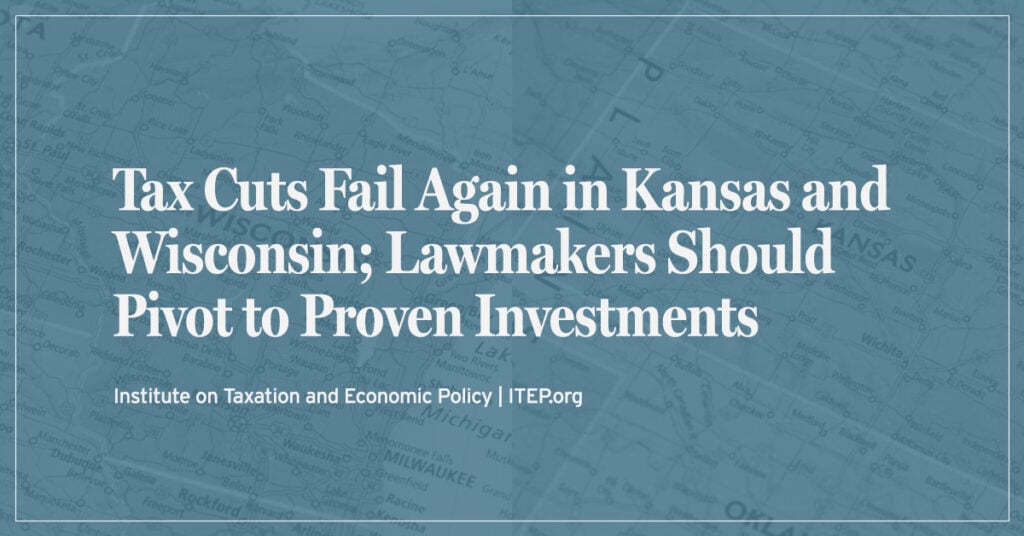Many state legislative sessions are in the final stretch, meaning lawmakers are pushing to get bills to governors’ desks, discussing compromises on the floor, and rehashing old proposals in hopes of getting them over the finish line. West Virginia lawmakers ended their legislative session with a bill that over time will fully exempt Social Security income from the state’s income tax – a proposal that will overwhelmingly benefit higher income seniors. The Nebraska legislature is at a stalemate as they consider Gov. Jim Pillen’s $2 billion property tax cut proposal with a month left in session. And in Kansas, a flat tax bill has reemerged in the form of a fully phased in 5.45 percent rate—coupled with other changes—after the legislature failed to override Gov. Laura Kelly’s veto of a previous flat tax proposal.
Major State Tax Proposals and Developments
- The KANSAS legislature introduced a new flat tax plan. This version would create a flat rate of 5.7 percent in 2024 that would drop to 5.45 percent by 2029. The plan also substantially increases personal exemptions and exempts additional Social Security income from tax. Even with an increase to the personal exemption, this flat tax proposal – which would cost $650 million when fully phased in – would give 40 percent of the tax cut to households in the top 20 percent of earners. The plan’s largest beneficiary would likely, again, be Kansas billionaire Charles Koch who would receive an estimated $458,000 annual tax cut. The legislation follows a recent veto by Gov. Laura Kelly and failed override of a separate flat tax proposal. – NEVA BUTKUS
- In NEW MEXICO, legislation that will add progressivity to the state’s tax system was signed into law by Gov. Michelle Lujan Grisham. The policies will cut individual income tax rates, further limit the state’s capital gains deduction for high-income earners and improve upon the state’s corporate income tax. – MARCO GUZMAN
- The NEW YORK House and Senate each released budget proposals this week. Both versions include small 0.5-percent temporary income tax increases on the state’s richest households – those with incomes over $5 million per year – though Gov. Kathy Hochul considers this a “nonstarter.” Tax credits to promote affordable housing are another topic that the two houses and governor have yet to agree on. The Senate’s proposal includes a Working Families Tax Credit that would replace the state’s existing Empire State Child Credit and Earned Income Credit with a combined credit meant to hold current recipients harmless and grow over time to boost family incomes and reduce child poverty. – DYLAN GRUNDMAN O’NEILL
- WEST VIRGINIA legislators passed a bill that over three years will fully exempt Social Security income from the state’s income tax for higher earning seniors. The state already exempts single filers earning $50,000 or less and $100,000 for couples. – ELI BYERLY-DUKE
State Roundup
- ALABAMA is the latest state to pass a universal school choice program. Students will receive a $7,000 education savings account that will be open to all students for the 2027 school year and can be used on private school tuition.
- Next week, Chicago, ILLINOIS voters will decide on the “Bring Chicago Home” referendum, a proposal that would create a dedicated revenue stream to support Chicago’s houseless population by increasing the one-time Real Estate Transfer Tax on property sales over $1 million while decreasing the transfer tax for nearly 95 percent of properties.
- MARYLAND lawmakers introduced legislation that would expand the state’s sales tax to certain services that are not currently taxed – including accounting, landscaping, and dry cleaning – while also reducing the overall sales tax rate from 6 percent to 5 percent. The bill is estimated to raise about $3 billion.
- A proposed bill out of MASSACHUSETTS would enact an annual excise tax of 2.5 percent on private collegiate institutions with endowments larger than $1 billion.
- The MICHIGAN Court of Appeals unanimously ruled that the personal income tax rate reduction for 2023 was intended to last for only one year after the rate was reduced from 4.25 percent to 4.05 percent when the state’s budget surplus exceeded a certain level when measured against inflation. An appeal to the Michigan Supreme Court is still possible.
- MISSOURI lawmakers are debating several versions of reductions in the state’s personal property taxes on cars. The measures would cost local governments about $350 billion, much of which would otherwise have funded public schools. Meanwhile, legislators have agreed to modestly boost funding for public schools alongside the increase of a tax credit for donations to private and religious schools.
- The NEBRASKA legislative session is drawing closer to an end and lawmakers still appear far from agreeing on a path toward Gov. Jim Pillen’s desired $2 billion property tax cut.
- TENNESSEE lawmakers appear unlikely to eliminate the state’s grocery tax with an offsetting increase in taxes on corporations this year, despite the popularity of the grocery tax elimination and public support of asking corporations to pay their fair share.
- SOUTH DAKOTA Gov. Kristi Noem signed legislation that modifies the eligibility requirements and increases exempt values for the property tax relief program for disabled veterans and their surviving spouses.
- VIRGINIA lawmakers passed the state budget that includes an expansion of the state’s sales tax to cover digital goods. However, a statement from Gov. Glenn Youngkin criticized the overall budget, which did not include his proposed cuts to the personal income tax, saying that more changes to the budget are needed.
- WASHINGTON State policymakers eliminated the state’s 37 percent tax on medical cannabis while retaining the tax for adult use.
What We’re Reading
- Corporations have steadily contributed less and less as share of federal tax receipts. Commentary in the Minnesota Reformer discusses a bill in Minnesota that would increase transparency around why this is happening by making state tax returns of large corporations public.
If you like what you are seeing in the Rundown (or even if you don’t) please send any feedback or tips for future posts to Aidan Davis at [email protected]. Click here to sign up to receive the Rundown via email.





